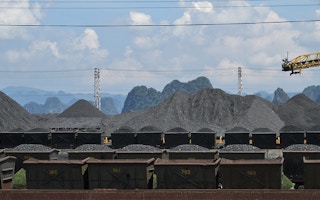What will be one of Vietnam’s largest coal-fired power stations has secured enough funding to get built, but a key member of the financing syndicate has pulled out following a campaign that highlighted a major conflict with the bank’s climate policy.
Financing closed on the US$1.87 billion, 1,200 megawatt Nghi Son 2 coal-fired power plant last week. But London-headquartered Standard Chartered Bank—which was initially part of a consortium of nine banks that includes Singapore’s Oversea-Chinese Banking Corporation (OCBC) and DBS, Malaysia’s Maybank and Japan Bank for International Cooperation—was absent from the final list of financiers.
A campaign by green groups Greenpeace and Market Forces pointed out that by financing the coal plant, StanChart was in breach of its own policy on energy and climate change. That policy rules out providing loans for coal plants above a certain emissions intensity.
The coal financing deal also goes against the Equator Principles, a framework for banks to assess the environmental and social risk of the infrastructure projects they finance, that StanChart signed in 2003.
“
Vietnam is well-placed for clean energy investment, but Singapore’s major banks continue to miss opportunities to fund a clean energy development pathway, instead locking in polluting coal for decades to come.
Julien Vincent, executive director, Market Forces
Standard Chartered Bank would not comment on the reason for pulling out of the deal, but confirmed that the bank is “not a lender of the Nghi Son 2 project” in an email shared with Eco-Business.
The plant, which is to be built in the northern province of Thanh Hoa, will generate twice as much carbon dioxide per unit of power as the average coal plant in Vietnam, and cause a big increase in air pollution-related deaths in the area, according to data from the journal of Environmental Science & Technology.
But banks including OCBC and DBS take the position that developing countries such as Vietnam need coal to fuel their fast-growing economies, and cannot yet rely on clean alternative energy sources. OCBC and DBS have funded 26 coal power projects in Asia worth more than US$2 billion over the last six years, according to data from Market Forces.
The NGO commented that by financing Nghi Son 2, OCBC and DBS, Southeast Asia’s two largest banks, are making “a mockery” of the Singapore government’s declaration that 2018 is the Year of Climate Action, a year in which Singapore companies have been encouraged to make pledges to fight climate change.
Market Forces added that the coal deal exposed the weakness of the banks’ climate commitments. DBS became the first bank in Asia to publish a climate policy in February, but the policy did not rule out financing coal power in developing countries.
“Standard Chartered sensibly exited the banking syndicate after it was revealed that Nghi Son 2 would breach the Equator Principles and Standard Chartered’s own policies. Unfortunately the same can’t be said for DBS and OCBC, whose substandard policies and commitments mean they still have no qualms about polluting Vietnamese lungs and worsening climate change,” said Market Forces executive director Julien Vincent.
“Vietnam is well-placed for clean energy investment, but Singapore’s major banks continue to miss opportunities to fund a clean energy development pathway, instead locking in polluting coal for decades to come,” he said.
The other banks in the syndicate are Sumitomo Mitsui Banking Corp, MUFG, Mizuho and Shinsei Bank of Japan, and Korean export credit agency Export-Import Bank of Korea.
Vietnam is the world’s third biggest producer of new coal power capacity, and Southeast Asia’s largest hotspot for coal. The fossil fuel is the single biggest contributor to global greenhouse gas emissions.
There are currently about 350 coal-fired power plants under construction in Southeast Asia, which Georg Kell, the founding director of the United Nations Global Compact, and now board chairman of Arabesque Partners, described as “collective suicide” at a green finance event in Singapore in February.

















